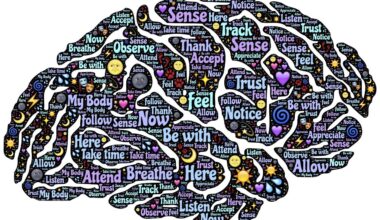Incorporating Rowing Into Therapy Programs for Mental Health
Rowing has emerged as a unique and effective method to enhance mental health through physical activity and connection with nature. Engaging in rowing offers therapeutic benefits, helping individuals cope with various mental health challenges. The rhythmic motion of rowing can provide a meditative experience, allowing participants to focus on their strokes and breathe. This focus can help ease anxiety and promote a sense of calm. Additionally, rowing encourages physical fitness, which is crucial for releasing endorphins, the body’s natural mood lifters. Furthermore, the group dynamics involved in rowing promote social interaction and teamwork, essential components for mental well-being. Participants can establish connections with peers, reducing feelings of isolation often associated with mental disorders. Rowing can thus be an effective therapy tool, facilitating emotional expression and coping strategies. For many, being on the water can evoke feelings of serenity, which complement traditional therapy modalities. As awareness increases, more mental health professionals are considering rowing as part of comprehensive treatment plans. Integrating this activity can help individuals developing skills beneficial both on and off the water. Overall, incorporating rowing can provide significant advantages to clients seeking alternative therapy options.
The Physiological Effects of Rowing
The physiological effects of rowing extend beyond mere exercise; they encompass holistic benefits to mental health. Rowing is a low-impact aerobic activity that engages multiple muscle groups, enhancing cardiovascular fitness. Research shows that regular physical activity, such as rowing, can significantly reduce symptoms of anxiety and depression. The repetitive motion can help establish a rhythm, giving participants a sense of control and accomplishment as they successfully row. Furthermore, being outdoors while rowing produces a unique psychological calmness that positively affects mental state. Exposure to natural environments has been linked to reduced stress levels and improvements in mood. Moreover, rowing enhances endurance and strength, contributing to overall physical health, which is intrinsically linked to mental well-being. As individuals develop their rowing skills, they may experience increased self-esteem and confidence, essential factors in the journey of recovery from mental health issues. Rowing classes can instill a sense of discipline and commitment, promoting mental resilience. Therapeutic rowing programs have been shown to cultivate mindfulness, helping individuals appreciate the present moment while engaging in a positive activity. Ultimately, incorporating these physiological benefits into therapy programs can yield remarkable results for participants.
Rowing serves as an excellent medium for teamwork and social skill development in therapeutic settings. One of the primary benefits of group rowing activities is the fostering of communication among participants. These interactions are vital in therapy programs, particularly for those dealing with social anxiety or isolation. Rowing emphasizes collaboration, requiring rowers to sync their movements, which inherently promotes cooperation and understanding. Through shared experiences, individuals can bond, facilitating friendships that extend beyond the water. This social element helps diminish feelings of loneliness found in many mental health conditions. Furthermore, therapy sessions that incorporate rowing can explore themes of leadership and trust, enhancing personal growth. Participants also learn to manage group dynamics effectively, such as handling conflict or celebrating achievements together. Engaging in group activities boosts motivation, creates a sense of belonging, and often leads to lasting changes in personal outlook. The laughter, conversation, and shared challenges on the water enhance the therapeutic experience, creating lasting memories and supportive networks. With individualized focus, the rowing community offers a unique supportive environment for personal development. Ultimately, embracing teamwork through rowing can lead to transformative changes for individuals seeking mental health improvement.
Mindfulness and Rowing
Incorporating mindfulness techniques within rowing practices can significantly enhance the mental health benefits of this activity. Mindfulness is the practice of being fully engaged in the present moment, which aligns beautifully with the rhythmic and meditative nature of rowing. As participants focus on their strokes and synchronize with their crew members, they engage in a form of moving meditation that can help reduce intrusive thoughts and anxiety. Deep breathing techniques employed during rowing can also promote relaxation and stress reduction. Participants often find that concentrating on their breath and movement allows them to let go of stressors outside of the water, creating a mental escape. This heightened awareness can lead to significant improvements in emotional regulation and resilience in coping with life’s challenges. Furthermore, counselors and therapists can integrate mindfulness exercises into rowing sessions, encouraging participants to reflect on their experiences and emotions. Incorporating these reflective moments allows participants to identify their feelings and find constructive ways to deal with them. Engaging in this combined approach promotes healing and self-awareness by helping participants connect more profoundly with themselves and their surroundings. Ultimately, mindfulness practices can considerably enrich the development of mental well-being through rowing.
Rowing organizations and mental health professionals are increasingly recognizing the potential of this sport within therapeutic programs. Many have begun developing collaborative initiatives to introduce rowing to various communities. By offering accessible programs, these organizations can address a diverse range of participants who might benefit from such activities, particularly those facing mental health challenges. Partnerships with local rowing clubs create opportunities for workshops focused on mental well-being and team-building exercises. These initiatives provide resources for individuals looking to engage in physical activity, thereby breaking barriers related to mental health stigma. Additionally, educational materials focusing on the benefits of rowing can empower participants to understand how this sport can positively impact their lives. Developing community outreach programs fosters inclusivity and encourages families to become active in these efforts. Moreover, initiatives can raise awareness of mental health issues and promote discussions around treatment options available through physical activities. With committed involvement from community leaders, it is possible to build supportive environments where individuals feel comfortable addressing their mental health needs. Thus, integrating rowing programs within local mental health initiatives is vital for reaching a broader audience and enhancing overall wellness.
Testimonials and Success Stories
Real-life testimonials and success stories illuminate the transformative impact of incorporating rowing into mental health therapy. Many participants report profound changes in their mental health after engaging in rowing programs. A common theme among these accounts is the enhanced sense of belonging and community they feel while rowing with others. Formerly isolated individuals express gratitude for the social connections formed through participating, highlighting that these relationships significantly reduced feelings of loneliness and anxiety. Additionally, many report improvements in their physical fitness, which have positively impacted their self-esteem and mood. Furthermore, participants describe how focusing on rowing techniques offers a constructive outlet for overwhelming emotions. The meditative aspects of rowing help individuals connect with their thoughts and feelings, often leading to personal breakthroughs. Stories of resilience and recovery echo the potential that rowing programs hold in therapy. Many participants claim they have found a renewed passion for life through their experiences on the water. As these testimonials illustrate, the effectiveness of rowing as a therapeutic option is gaining acknowledgment. Sharing such narratives can inspire others to explore rowing and its accompanying mental health benefits, helping to pave the way to recovery.
The future of rowing in mental health therapy looks promising as more research emerges. Ongoing studies are exploring the physiological and psychological effects of rowing on individuals battling mental health challenges. Current findings indicate that rowing significantly decreases anxiety levels and boosts overall mood, establishing a compelling case for incorporating it into therapy programs. Furthermore, researchers are investigating the long-term benefits that consistent rowing may have, including improved coping strategies and resilience. Mental health professionals are encouraged to examine the outcomes from various programs actively. Collecting data and measuring success rates can pave the way for refining rowing techniques that effectively support mental health recovery. Additionally, integrating training for therapists focusing on rowing could foster collaboration and improvement of program structures. Associations between physical activity and mental health are gaining traction, and rowing presents a unique modality worth exploring. The more professionals understand rowing’s benefits, the more they can tailor approaches to individuals’ specific needs. Committing to this blend of recreation and mental health support can ultimately lead to innovative therapy avenues, allowing clients to thrive. With continued support for research and community involvement, rowing may become a pivotal component of mental health therapy strategies in the coming years.


